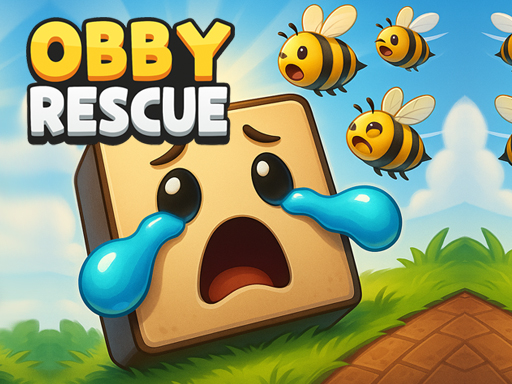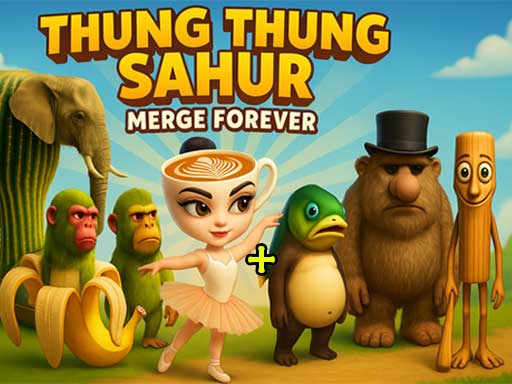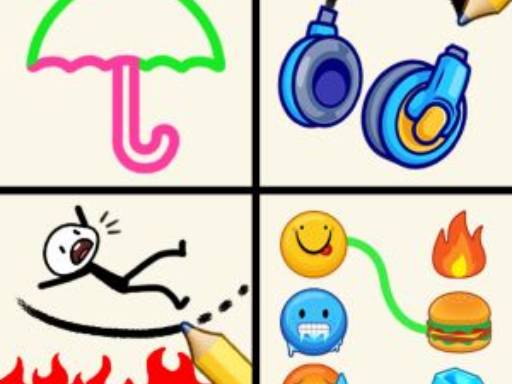Lost & Found Dash
About Lost & Found Dash
Okay, so you know how sometimes you just stumble upon a game, maybe through a random recommendation or just scrolling through a store, and it just *clicks*? Like, instantly? That’s exactly what happened to me with this game, *Lost & Found Dash*. Honestly, I haven't been this genuinely excited about a hypercasual title in ages, and I just *had* to tell you about it because I think you’re going to absolutely love it.
Imagine this: one moment you’re soaring, the next, everything’s chaos, a terrifying cacophony of metal twisting and air rushing past, and then… silence. A jarring, ringing silence. You wake up, disoriented, the pilot of a downed plane, and everything around you is just… wild. Not just wild in a "nature preserve" kind of way, but *primal*. Thick, swaying grass stretches out endlessly, broken only by scattered debris from your plane and these mysterious, small islands dotting a vast, unseen water body. And the worst part? Your passengers, your responsibility, they’re not with you. They’re out there, stranded, scattered across those very islands, vulnerable.
That’s the opening, right? And it immediately grabs you. What I love about games like this is how they instantly give you a clear, urgent objective. There’s no hand-holding, no lengthy tutorial that drags on forever. You just *know* what you have to do: survive, and save everyone. It’s that raw, primal instinct kicking in, and the game just taps into it so perfectly. You feel that immediate weight on your shoulders, that gut-wrenching realization that you’re the only one who can fix this.
The moment you start moving, you realize the genius of the "Dash" part. This isn't some slow-paced survival sim where you meticulously manage every calorie. This is about momentum, about efficiency, about making every second count. You’re pushing through that tall, wild grass, and you can almost feel the resistance, the rustle against your virtual legs. The camera pulls back just enough to give you a good view, but not so far that you lose that sense of claustrophobia the wilderness creates. You’re constantly scanning, constantly moving.
The core loop, the absolute heart of what makes this game so addictive, is brilliant in its simplicity. You’re on your starting island, usually a bit larger, with some wreckage. Your first instinct is to scavenge, right? You tap on a piece of twisted fuselage, and *thwack, thwack, thwack* – you’re gathering metal scraps. You find a fallen tree, and *chop, chop, chop* – you’ve got wood. It’s incredibly satisfying, that immediate feedback. And the resources aren't just arbitrary numbers; they feel tangible. You know you need metal for a basic tool, wood for a bridge. It’s intuitive.
And then comes the crafting. Oh man, the crafting! It’s not complex, but it’s incredibly clever. You realize you can’t just swim to that next island where you *think* you saw a passenger. The water’s too wide, or there’s some unseen current. So, you open your simple crafting menu, and boom – a rudimentary raft, or maybe a bridge segment, or even a grappling hook, suddenly appears as an option, provided you have the resources. There’s something magical about that moment when a strategy finally clicks into place. You’ve been staring at an impassable gap, feeling that familiar gaming frustration, and then you see the solution, gather the parts, and *poof*, you’ve built your way forward. That feeling of empowerment, of overcoming a seemingly impossible obstacle with just a few basic tools, is just pure gaming bliss.
You’ll find yourself developing this rhythm. Dash, scavenge, craft, dash again. But it’s never monotonous because the landscape is constantly changing. Each island is a mini-puzzle in itself. Maybe one requires you to clear a path through dense vines. Another might have a broken-down vehicle that needs a specific part to be salvaged before you can use it to cross a wider chasm. The brilliant thing about this is how organically the gameplay features are integrated. The city's streets aren't just roads; they're a puzzle, demanding perfect drifts around hairpin turns and split-second decisions to outmaneuver rivals. Here, the wild grass isn't just scenery; it's a labyrinth, a resource pool, and a potential hiding spot for those unknown dangers.
Speaking of dangers, that’s where the game really starts to build tension. At first, it’s just the environment – the vastness, the isolation. But as you venture further, you start seeing subtle hints. A shadow moving in the distance, a strange sound carried on the wind, a patch of disturbed earth. The game doesn't throw jump scares at you, which I appreciate. Instead, it cultivates this slow-burn dread, this constant awareness that you’re not alone, and whatever *is* out there might not be friendly. It makes every dash feel a little more urgent, every decision a little more critical. You’re not just racing against the clock to save your passengers; you’re racing against an encroaching, unseen threat. It makes you lean forward in your chair, your heart rate just a little bit higher than it should be for a "casual" game.
The real magic, though, happens when you finally reach a stranded passenger. You’ve navigated treacherous terrain, crafted ingenious solutions, maybe even narrowly avoided whatever lurks in the shadows, and there they are. A little icon, usually huddled and scared. You tap on them, and they join your growing party. It’s such a simple mechanic, but the emotional payoff is huge. Each rescue feels like a genuine accomplishment, a small victory in a much larger struggle. You can almost feel the relief wash over you, not just for the passenger, but for yourself, knowing you’re one step closer to reuniting everyone. And then, the cycle begins again: find the next passenger, figure out the path, gather the resources, craft the tools, and dash through the unknown.
What's fascinating is how *Lost & Found Dash* manages to be hypercasual – easy to pick up, quick sessions, intuitive controls – while still delivering such a compelling sense of adventure and urgency. It’s not just mindless tapping; there’s a genuine strategic element, a constant mental calculation of resources versus needs, risk versus reward. You’ll find yourself planning routes, prioritizing which passenger to rescue first based on accessibility or potential resource nodes nearby. This makes me wonder how much thought went into the procedural generation of these islands, because each playthrough feels fresh and presents new challenges.
In my experience, the best moments come when you’re down to your last few scraps of wood, staring at a gap that seems just *slightly* too wide, and you have that "aha!" moment. Maybe you realize you can dismantle an unused tool for a crucial piece, or that there’s a hidden path through a dense thicket you overlooked. That feeling of pulling off a clutch move, of making your limited resources stretch just far enough, is incredibly satisfying. It's that kind of resourcefulness, that ingenuity, that makes you feel like a true survivor.
Honestly, I've always been drawn to games that give you a strong sense of purpose, and *Lost & Found Dash* delivers that in spades. It’s not just about getting a high score; it’s about a mission, a responsibility. It’s about conquering the wild, outsmarting the environment, and ultimately, saving lives. It’s a game that respects your time, offering quick bursts of intense, satisfying gameplay, but it also hooks you deep enough that you’ll lose track of time, just wanting to rescue "one more" passenger, explore "one more" island. The visual style is clean and appealing, the sounds are immersive – the wind, the rustling grass, the *thwack* of your tools – it all pulls you into this enigmatic realm. You can almost hear the engine roar, feel the controller in your hands, and sense the urgency of the next challenge. It truly is a discovery, and I genuinely think you should check it out. You won't regret it.
Imagine this: one moment you’re soaring, the next, everything’s chaos, a terrifying cacophony of metal twisting and air rushing past, and then… silence. A jarring, ringing silence. You wake up, disoriented, the pilot of a downed plane, and everything around you is just… wild. Not just wild in a "nature preserve" kind of way, but *primal*. Thick, swaying grass stretches out endlessly, broken only by scattered debris from your plane and these mysterious, small islands dotting a vast, unseen water body. And the worst part? Your passengers, your responsibility, they’re not with you. They’re out there, stranded, scattered across those very islands, vulnerable.
That’s the opening, right? And it immediately grabs you. What I love about games like this is how they instantly give you a clear, urgent objective. There’s no hand-holding, no lengthy tutorial that drags on forever. You just *know* what you have to do: survive, and save everyone. It’s that raw, primal instinct kicking in, and the game just taps into it so perfectly. You feel that immediate weight on your shoulders, that gut-wrenching realization that you’re the only one who can fix this.
The moment you start moving, you realize the genius of the "Dash" part. This isn't some slow-paced survival sim where you meticulously manage every calorie. This is about momentum, about efficiency, about making every second count. You’re pushing through that tall, wild grass, and you can almost feel the resistance, the rustle against your virtual legs. The camera pulls back just enough to give you a good view, but not so far that you lose that sense of claustrophobia the wilderness creates. You’re constantly scanning, constantly moving.
The core loop, the absolute heart of what makes this game so addictive, is brilliant in its simplicity. You’re on your starting island, usually a bit larger, with some wreckage. Your first instinct is to scavenge, right? You tap on a piece of twisted fuselage, and *thwack, thwack, thwack* – you’re gathering metal scraps. You find a fallen tree, and *chop, chop, chop* – you’ve got wood. It’s incredibly satisfying, that immediate feedback. And the resources aren't just arbitrary numbers; they feel tangible. You know you need metal for a basic tool, wood for a bridge. It’s intuitive.
And then comes the crafting. Oh man, the crafting! It’s not complex, but it’s incredibly clever. You realize you can’t just swim to that next island where you *think* you saw a passenger. The water’s too wide, or there’s some unseen current. So, you open your simple crafting menu, and boom – a rudimentary raft, or maybe a bridge segment, or even a grappling hook, suddenly appears as an option, provided you have the resources. There’s something magical about that moment when a strategy finally clicks into place. You’ve been staring at an impassable gap, feeling that familiar gaming frustration, and then you see the solution, gather the parts, and *poof*, you’ve built your way forward. That feeling of empowerment, of overcoming a seemingly impossible obstacle with just a few basic tools, is just pure gaming bliss.
You’ll find yourself developing this rhythm. Dash, scavenge, craft, dash again. But it’s never monotonous because the landscape is constantly changing. Each island is a mini-puzzle in itself. Maybe one requires you to clear a path through dense vines. Another might have a broken-down vehicle that needs a specific part to be salvaged before you can use it to cross a wider chasm. The brilliant thing about this is how organically the gameplay features are integrated. The city's streets aren't just roads; they're a puzzle, demanding perfect drifts around hairpin turns and split-second decisions to outmaneuver rivals. Here, the wild grass isn't just scenery; it's a labyrinth, a resource pool, and a potential hiding spot for those unknown dangers.
Speaking of dangers, that’s where the game really starts to build tension. At first, it’s just the environment – the vastness, the isolation. But as you venture further, you start seeing subtle hints. A shadow moving in the distance, a strange sound carried on the wind, a patch of disturbed earth. The game doesn't throw jump scares at you, which I appreciate. Instead, it cultivates this slow-burn dread, this constant awareness that you’re not alone, and whatever *is* out there might not be friendly. It makes every dash feel a little more urgent, every decision a little more critical. You’re not just racing against the clock to save your passengers; you’re racing against an encroaching, unseen threat. It makes you lean forward in your chair, your heart rate just a little bit higher than it should be for a "casual" game.
The real magic, though, happens when you finally reach a stranded passenger. You’ve navigated treacherous terrain, crafted ingenious solutions, maybe even narrowly avoided whatever lurks in the shadows, and there they are. A little icon, usually huddled and scared. You tap on them, and they join your growing party. It’s such a simple mechanic, but the emotional payoff is huge. Each rescue feels like a genuine accomplishment, a small victory in a much larger struggle. You can almost feel the relief wash over you, not just for the passenger, but for yourself, knowing you’re one step closer to reuniting everyone. And then, the cycle begins again: find the next passenger, figure out the path, gather the resources, craft the tools, and dash through the unknown.
What's fascinating is how *Lost & Found Dash* manages to be hypercasual – easy to pick up, quick sessions, intuitive controls – while still delivering such a compelling sense of adventure and urgency. It’s not just mindless tapping; there’s a genuine strategic element, a constant mental calculation of resources versus needs, risk versus reward. You’ll find yourself planning routes, prioritizing which passenger to rescue first based on accessibility or potential resource nodes nearby. This makes me wonder how much thought went into the procedural generation of these islands, because each playthrough feels fresh and presents new challenges.
In my experience, the best moments come when you’re down to your last few scraps of wood, staring at a gap that seems just *slightly* too wide, and you have that "aha!" moment. Maybe you realize you can dismantle an unused tool for a crucial piece, or that there’s a hidden path through a dense thicket you overlooked. That feeling of pulling off a clutch move, of making your limited resources stretch just far enough, is incredibly satisfying. It's that kind of resourcefulness, that ingenuity, that makes you feel like a true survivor.
Honestly, I've always been drawn to games that give you a strong sense of purpose, and *Lost & Found Dash* delivers that in spades. It’s not just about getting a high score; it’s about a mission, a responsibility. It’s about conquering the wild, outsmarting the environment, and ultimately, saving lives. It’s a game that respects your time, offering quick bursts of intense, satisfying gameplay, but it also hooks you deep enough that you’ll lose track of time, just wanting to rescue "one more" passenger, explore "one more" island. The visual style is clean and appealing, the sounds are immersive – the wind, the rustling grass, the *thwack* of your tools – it all pulls you into this enigmatic realm. You can almost hear the engine roar, feel the controller in your hands, and sense the urgency of the next challenge. It truly is a discovery, and I genuinely think you should check it out. You won't regret it.
Enjoy playing Lost & Found Dash online for free on Viralexclusivo Games. This Arcade game offers amazing gameplay and stunning graphics. No downloads required, play directly in your browser!
How to Play
Desktop Controls W uarr Up Arrow Move forward S darr Down Arrow Move backward A larr Left Arrow Move left D rarr Right Arrow Move right Mobile Controls On-Screen Joystick Move in all directions by dragging the joystick





Comments
This game is awesome! I love the graphics and gameplay.
One of the best games I've played recently. Highly recommended!